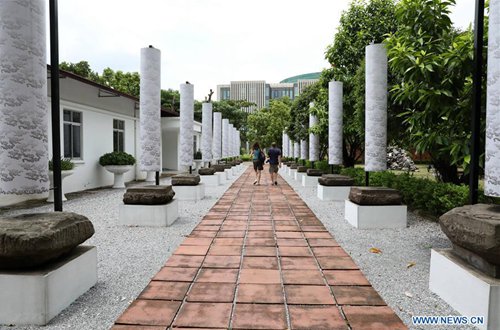HOME >> SOURCE,SPECIAL-COVERAGE
Epidemic cripples Vietnam’s rising manufacturing sector as supplies from China disrupted
By Zhang Dan and Zhang Hongpei Source:Global Times Published: 2020/2/12 20:03:40
Manufacturing in SE Asian nation hit as supplies from China disrupted

Two visitors walk in the Imperial Citadel of Thang Long in Vietnam's capital Hanoi, Aug. 23, 2019. The Imperial Citadel of Thang Long was built in the 11th century. Situated at the heart of Hanoi, the central sector of the Imperial Citadel of Thang Long was inscribed on the World Heritage List by the UNESCO in 2010. (Photo: Xinhua)
Trade between China and Vietnam is likely to decrease 20 to 30 percent over the year since little production has been done in the first two months of the year due to the outbreak of the deadly virus, business representatives told the Global Times.
Delays of work resumption in a good number of factories and traffic constraints have severely affected normal trade with Vietnam and disrupted the supply chain, they say.
"The impact of the epidemic on China-Vietnam trade will be significant," Li Wei, head of the Business Association of China in Haiphong, a major industrial port city in Vietnam, told the Global Times.
He estimated that bilateral trade is likely to decrease 20-30 percent during the year because little production was done in the first two months of the year.
Bilateral trade in January fell 25.8 percent from December and was down 11.8 percent from a year earlier, the Vietnamese government said in a statement.
Hiring about 20,000 Chinese workers, the 110 Chinese companies in Haiphong are mostly export-oriented processing enterprises, with some providing products to world-famous brands such as Victoria's Secret, Fuji Xerox and Kyocera Group, according to Li.
In Vietnam, which is an emerging global manufacturing hub, the virus outbreak also impeded factory production with Chinese investment.
He Jiaming, head of the Dongguan Shoe Chamber of Commerce and chairman of Dongguan Jieshimei Shoes Materials Co, told the Global Times that he took over a factory in Vietnam last year, which was put into operation at the end of 2019. "I had planned to open more facilities there in 2020 but now it seems I have to do some adjustment."
"Most of the factories with Chinese investment only started part of their production lines, due to lack of Chinese workers at important posts," Li said. In addition to workers, the lack of production materials resulted in production difficulties for these factories. Vietnam relies heavily on China for raw materials and equipment for its labor-intensive manufacturing.
"Friendship Pass [a busy border pass in South China's Guangxi Zhuang Autonomous Region] only allows about 25 lorries to enter Vietnam per day recently, and most of those shipments involve fruit instead of manufacturing materials," Li said, noting there has been no way to commence mass production so far.
Tran Van Giang, general manager at a shoemaking company near Ho Chi Minh City, told the Global Times that his company is very concerned about the epidemic and is monitoring the impact.
"The virus interrupted the import of materials from China and all factories in Vietnam are inhibited," Tran said. Faced with the impact, Tran said that he has started to seek suppliers in other countries.
Anticipating preferential policies for affected factories from the Vietnamese government, Li said the country also does not want foreign investment to leave.
He noted the association will provide consulting and liaison aid for Chinese enterprises but there is nothing the organization can do to help with their production at the moment, adding that the confidence of Chinese investors in Vietnam may also drop due to local government's reactions to Chinese workers.
"More than 300 Chinese have been quarantined in Haiphong after returning from China since February 2. Moreover, they are staying in a nasty environment with six to seven people in one room," Li told the Global Times.
Although the World Health Organization (WHO) warned against sweeping travel restrictions, Vietnam Airlines suspended flights to Chinese mainland, Hong Kong Special Administrative Region and the island of Taiwan since February 1.
Vietnam's health ministry on Tuesday reported a 15th confirmed case of the novel coronavirus pneumonia.
China remains Vietnam's largest trading partner. In 2019, bilateral trade reached $162 billion, up 9.6 percent year-on-year, data from Chin's General Administration of Customs showed in January.
Newspaper headline: Epidemic cripples Vietnam’s rising factories